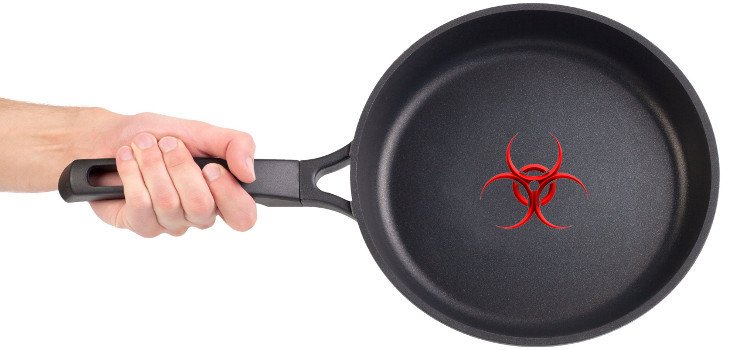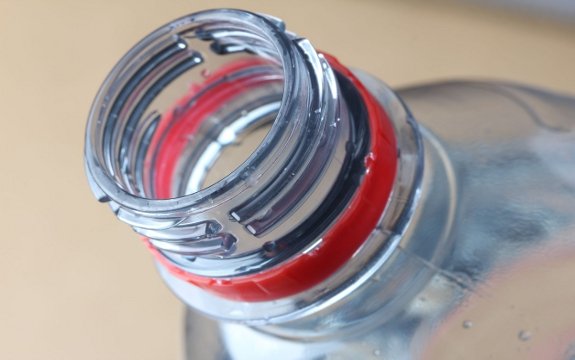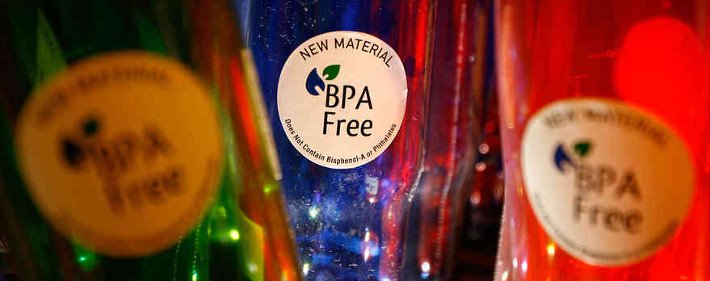These Common Kitchen Items are More Toxic than You Think

How many times each day do you drink or eat from a plastic container? If you’re like many Americans, it’s probably often. You may think you’re being healthy — lots of bottled water, “lite” or low-sodium soups from cans and the occasional bottled 100% fruit juice. But unfortunately, these choices aren’t free of health concerns.
Most Water Bottles and Canned Goods
The plastic bottles containing water and various other beverages as well as soup-can linings contain bisphenol-a (BPA), a chemical that has demonstrated toxic effects.
There are other similar chemicals as well, ones that linger in packaging and overlooked substances, that you probably come in contact with regularly. Chemical compounds like PFOS, PFOA and PTFE, for example, can be found in non-stick cookware and carpet. To understand these chemicals, and how to best avoid ingesting them, read the tips below.
BPA consumption has been linked to the development of a bad gene called Kcc2. This gene impairs brain function by harming the central nervous system and the body’s natural chloride filtration.
Despite these negative effects, the FDA dismissed a BPA ban in 2012. Consequently, you can expect to find BPA in everyday items and, unfortunately, in your system. According to a study by The Centers for Disease Control and Prevention, 93 percent of people had BPA in their urine.

To avoid BPA, do not buy plastic water bottles. Not only do they harm the environment, but they also contain BPA that can get into your body and wreak havoc on your nervous system. Instead, invest in a stainless steel canteen or use a glass mason jar. Also avoid other drinks packaged in plastic. Opt for items packaged in glass.
BPA is also found in cans: soups, baby formula and more. Check labels and purchase items packaged in BPA-free plastic and aluminum (if you must buy these items). Also reference the recycle number on the back of your container — if it says 7, don’t buy it.
Look for recycle numbers 2, 4 and 5 — they’re safest. Toss your plastic cups and containers if they’re scratched, as they’re more likely to emit chemicals into your food/drink.
Read: 6 Toxic Products to Eliminate from Your Home
Avoiding Teflon (Nonstick Cookware) and Microwavable Popcorn
PFOA or C8 (perfluorooctanoic acid) has been linked to tumors and developmental issues in animals. Johns Hopkins conducted a study that connected PFOA with decreased body weight in infant humans, too.
Perfluorooctane sulfonate (PFOS) is a compound like PFOA, found in many stain repellants, that has been associated with kidney cancer, testicular cancer, ulcerative colitis, thyroid disease, high cholesterol and pregnancy-induced hypertension.
Polytetrafluoroethylene (PTFE) has numerous applications, one of which is Teflon found in non-stick and non-scratch cookware. PTFE contains PFOA, and is thus linked to the aforementioned health concerns.
These chemical compounds are found in numerous food-related items (microwavable popcorn bags, for instance), toiletries like shampoo and even clothing. One of the most prominently used items containing dangerous PTFE is non-stick and non-scratch cookware.
To avoid these chemicals, try using ceramic cookware, which is PFOA- and PTFE free. You can also pop your popcorn on the stove top instead of purchasing PFOA-riddled microwavable bags. Candy wrappers also contain these compounds, so look for PFOA-free packaging or look for something else to appease your sweet tooth.
If you’re an expecting mother, beware of these compounds, as they can negatively impact the growth of your child (lowered birth weight and decreased head circumference has been linked to PFOS and PFOA).
Overall Take Away

When you can, avoid plastic. Purchase foods that have no packaging, like local produce or meat fresh from the butcher. When buying items at the grocery store, look for those in glass or specifically labeled “BPA-free.”
Here is a list of common items you should consider avoiding:
- Plastic
- Canned goods
- Teflon (nonstick cookware)
- Microwavable popcorn
- Conventional shampoo
